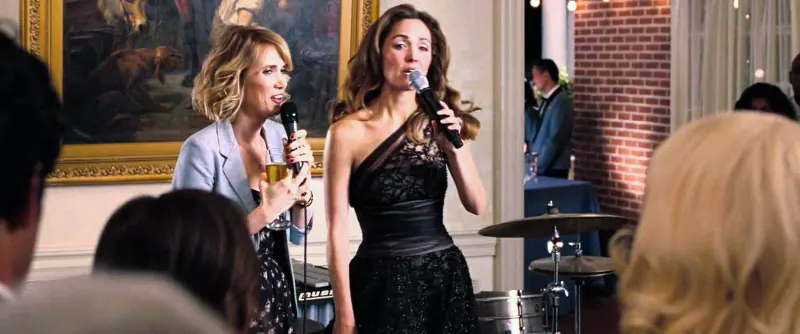Bridesmaids: Duelling Speeches
Kristen Wiig & Maya Rudolph's Speech Battle
Soon after Bridesmaids hit the theatres, comparisons were drawn with The Hangover. To my taste, Bridesmaids is smarter and it doesn't dilute its main character with too many sidekicks, which makes Annie Walker a more powerful hero (in the transformational sense) than Stu. Annie has many issues... and not many friends. She doesn't know what she wants, she puts everyone else before herself and she can't trust. We learn how this affects her entire life, with her player boyfriend (Jon Hamm), at work in the jewellery store and even with her best friend Lilian.
CONTINUING INCITING INCIDENT
In what looks like the inciting incident, Annie's world collapses with Lilian's engagement. Unable to show her feelings, Annie pretends to be happy for Lilian but really is in pain. Much worse, at the engagement party Lil seems to be a lot closer to her wealthy friend Helen than she had ever been to Annie. Now Annie is devastated; not only has she lost her best friend to the future husband, Lilian may never even have looked at her as a best friend. This is the movie's real Inciting Incident (Call to Adventure) as we all lose best friends sooner or later – but Annie thinks she never really had one.
A POWERFUL THEME: ABANDONMENT
Bridesmaids is thematically built around one of the most powerful themes: abandonment. We find it in countless romantic movies and even in a bunch of kids animations - check out the Pixar movies. In a way Bridesmaids is close to Toy Story: its main character is replaced by a newer, 'better best friend'. Despite its abundance of laugh-out-loud hysteria, Bridesmaids is a lot darker than Toy Story. Woody realises at the mid point that Buzz is not an enemy but a new friend, where Annie doesn't accept Helen until the movie's resolution.

THE MOMENT: DUELLING SPEECHES
At the engagement party, Annie is asked to deliver a speech. She's not in a great place, so she keeps it brief. Very brief. It gives Helen the opportunity to take the mic and share with Lilian (and the audience) what she has meant to her: "You made me realise how I can trust people again." This is an ironic reference to the journey Annie needs to go through, as earlier in the first act she urges a couple of love doves not to trust anyone - not even their partner. It is also a great foreshadowing of the climax and resolution, where we learn what lies behind the words in Helen's speech.
THE CRINGE FACTOR
But Annie doesn't really listen. All she feels is fear, abandonment and the need to reaffirm herself. So she does the worst thing possible: she tries to prove that she is the real best friend – but instead proves she is a fool. What follows is one of the most delightful cringe-fests in cinema history. Helen in turn grabs the mic off Annie and continues her speech, adding more fuel to the fire. The situation becomes unbearably embarrassing when Annie in desperation keeps prying the mic off Helen and failing to outclass her. You would fear we might lose respect for Annie but it appears the writers knew what they were doing. Kristen Wiig and Annie Mummalo got the tone of this scene and the entire movie so right that to me they became instant-classics.
Karel Segers
Karel Segers wrote his first produced screenplay at age 17. Today he is a story analyst, script editor and producer with experience in rights acquisition, script development and production. His
screenwriting classes have trained writers in Australia, Europe, Asia and the Middle East, and his clients include international award-winning filmmakers as well as three Academy Award nominees.
Karel is the founder of
The Story Department and he ranks in the world's Top 10 of most influential people for screenwriting on Twitter.